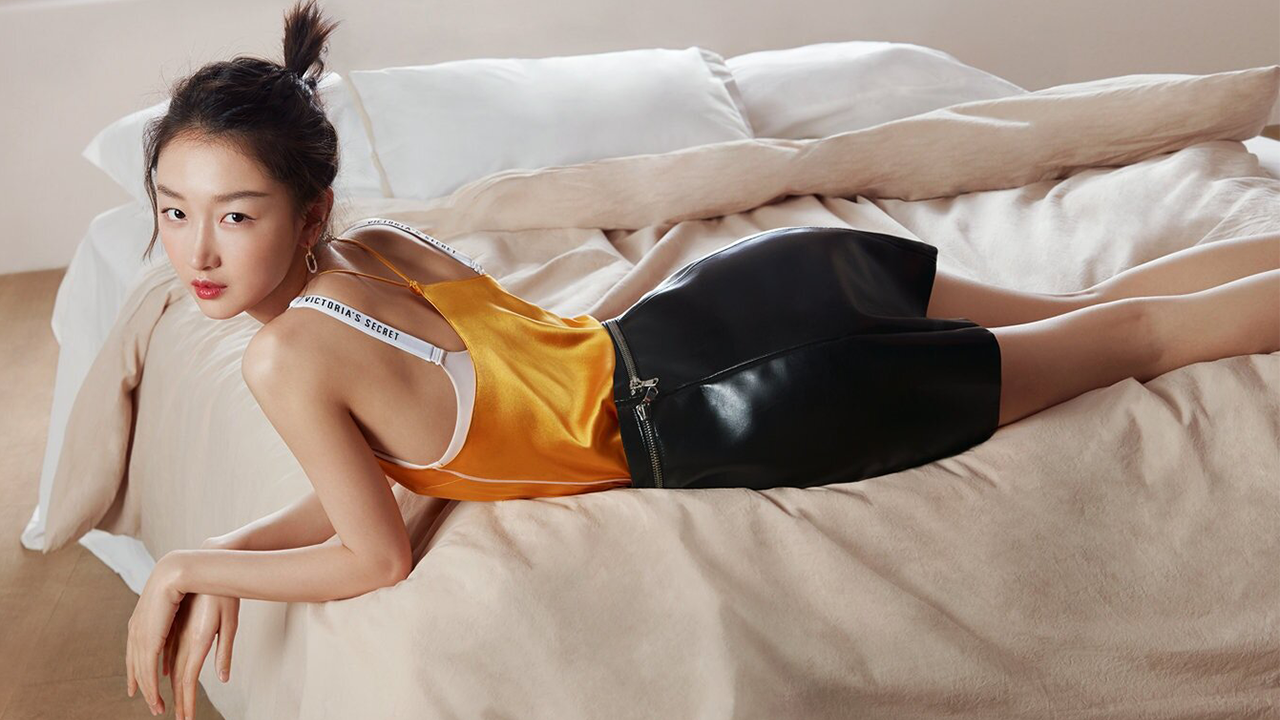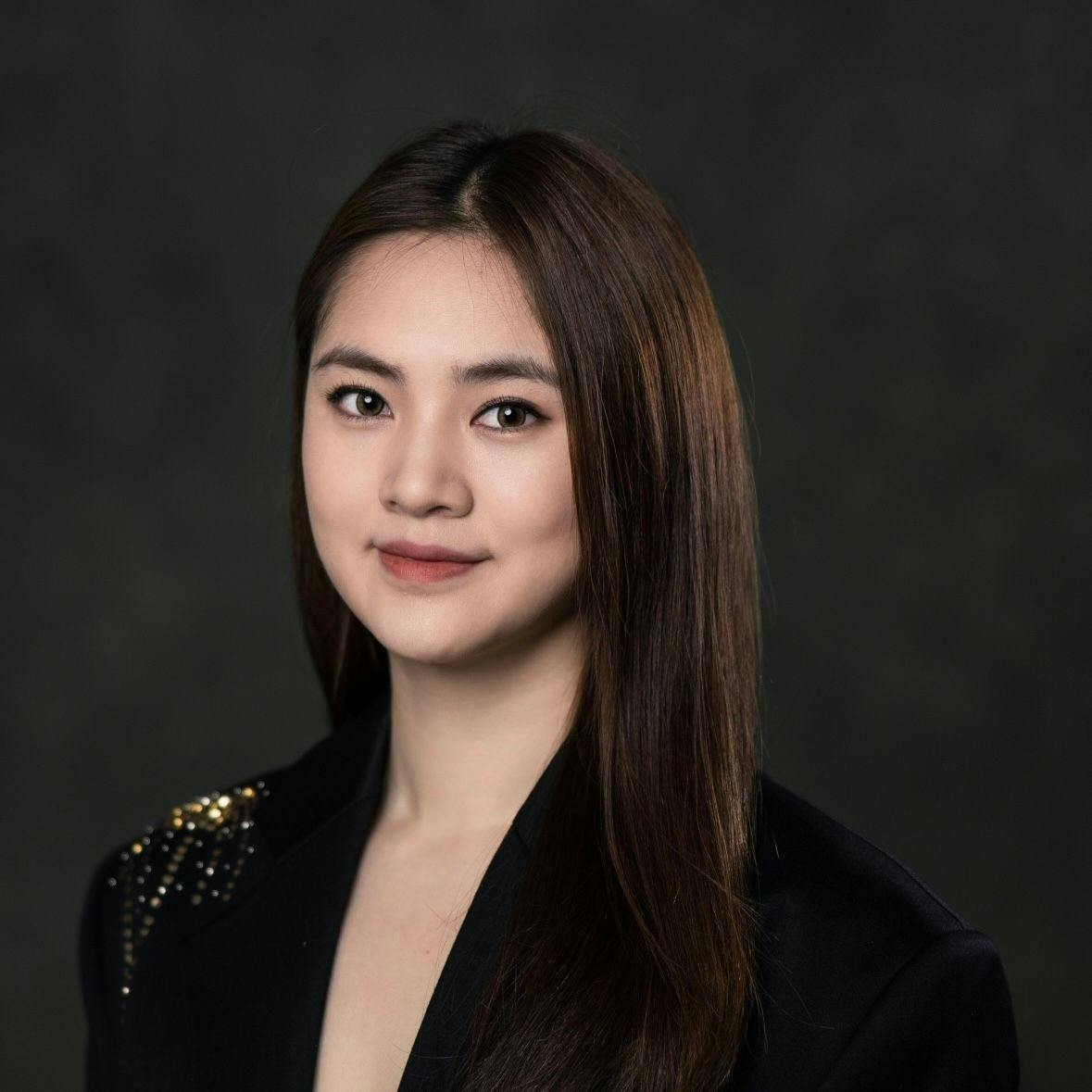The Social Edition is a weekly special-focus Jing Daily newsletter, which deep dives into luxury initiatives in China’s social media landscape. Every week, we highlight brand campaigns distributed on Chinese digital platforms — WeChat, Weibo, Tmall, Douyin, and beyond.
Our coverage spotlights global luxury brands, global beauty brands, and local Chinese brands. The latter gives insight into some of China’s most successful campaigns, which often come from local players, and are outside of the beauty and fashion space. In addition, we deliver need-to-know news, updates, and best practices on navigating social media platforms in China within the luxury space.
The below is an excerpt from The Social Edition newsletter. For weekly coverage, subscribe to the full newsletter here. In this week's edition, we look at three campaigns: from Victoria’s Secret’s new celebrity endorsement to Gucci's innovative monthly WeChat column featuring zodiacs.
VICTORIA'S SECRET REDEFINING SEXY#
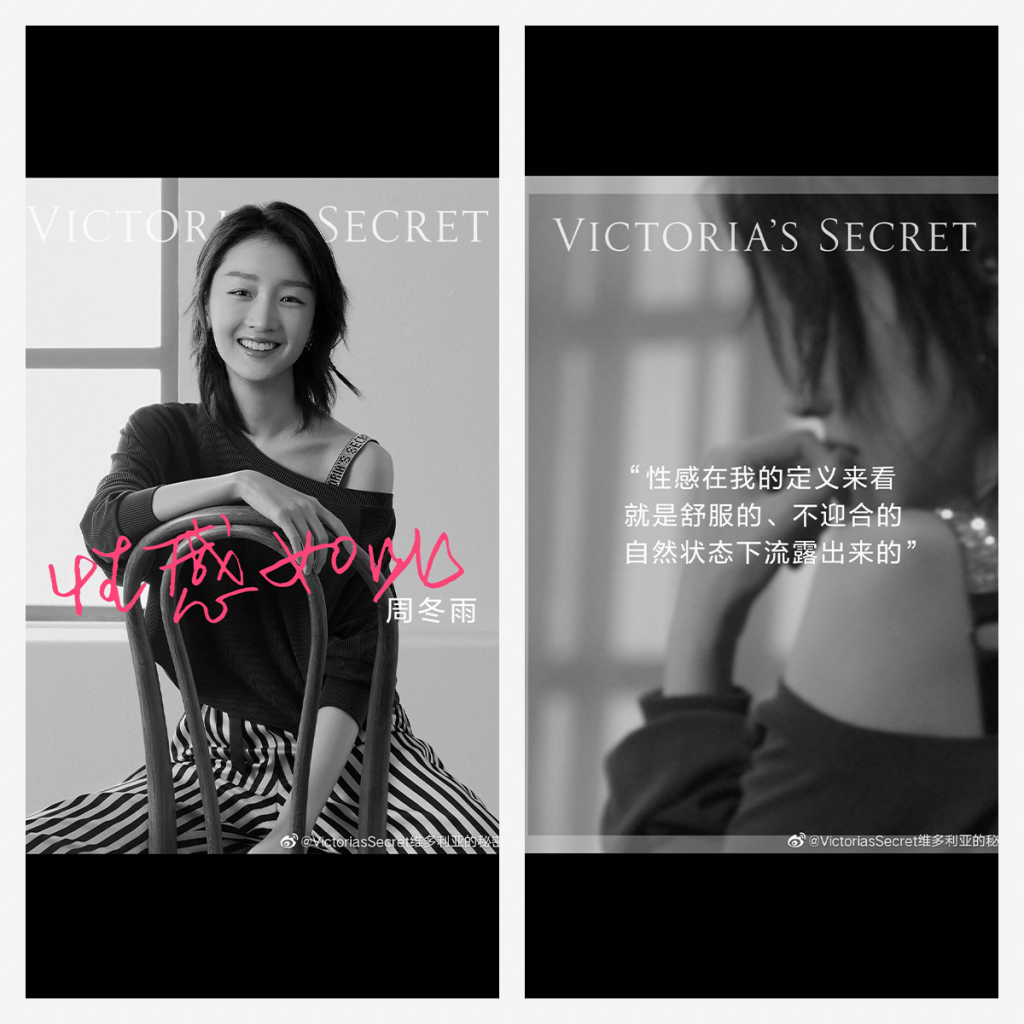
BRAND#
Victoria’s Secret
CATEGORY#
Lingerie
PLATFORMS#
MEDIUM#
Short Video, Imagery
OVERVIEW#
To rebrand Victoria’s Secret in China, the lingerie label named actresses Zhou Dongyu and Yang Mi as new brand ambassadors. The brand’s “Sexy Like This” campaign aims to redefine “sexy” in the context of contemporary femininity. In addition to the brand’s representative face — former Victoria’s Secret Angel Sui He — the campaign videos feature the newest ambassadors sharing their understanding of “sexy.” Among them, Zhou’s one-minute video breaks up stereotypes on the word sexy and reinterprets sexiness as “comfortable, nonconformist, and natural.”
FEATURED TALENT#
Zhou Dongyu (31M Followers) | Yang Mi (107M) | He Sui (7.9M)
NETIZEN REACTION#
Engagement with the brand’s official Weibo hashtag “Sexy like this” has skyrocketed since the brand announced brand ambassador Zhou Dongyu, reaching 24 million mentions in two days. The netizen-created Weibo hashtag “Zhou Dongyu is appointed as Victoria’s Secret’s Greater China Spokeswoman” has received over 3.8 million views. While the majority of online chatter centered around the new celebrity partnership, some netizens commented the endorsement is inappropriate for a lingerie line as Zhou’s lean and uncurvy body shape makes the product look like childrenswear. In addition to He Sui and Zhou Dongyu, the brand has previewed its next celebrity ambassador. Though their face has not been shown in the preview video, 11,000 commentators have guessed it will be Yang Mi.
VERDICT#
As the body positive movement spread across the world, Victoria’s Secret’s outdated body representation came under fire, resulting in the brand’s downturn. Only two years after its Shanghai runway show in 2017, the iconic annual event was halted. Soon after that, the brand’s parent company L Brand announced it sold a 55 percent stake of Victoria’s Secret to private equity firm Sycamore Partners. However, the firm now seeks to scrap the deal due to “international tragedy and health emergency.”
The new celebrity partnership indicates a departure for the company, who are apparently betting big on the Chinese market, where the body positive moment is quickly gaining steam. The success of local intimates wear brand NEIWAI’s “No Body is Nobody” campaign has proven this shift. However, Victoria’s Secret has decades of brand identity to rewrite and it remains to be seen if this new roster of ambassadors will be enough to save its business.
TIFFANY & CO. T1 LAUNCH CAMPAIGN#
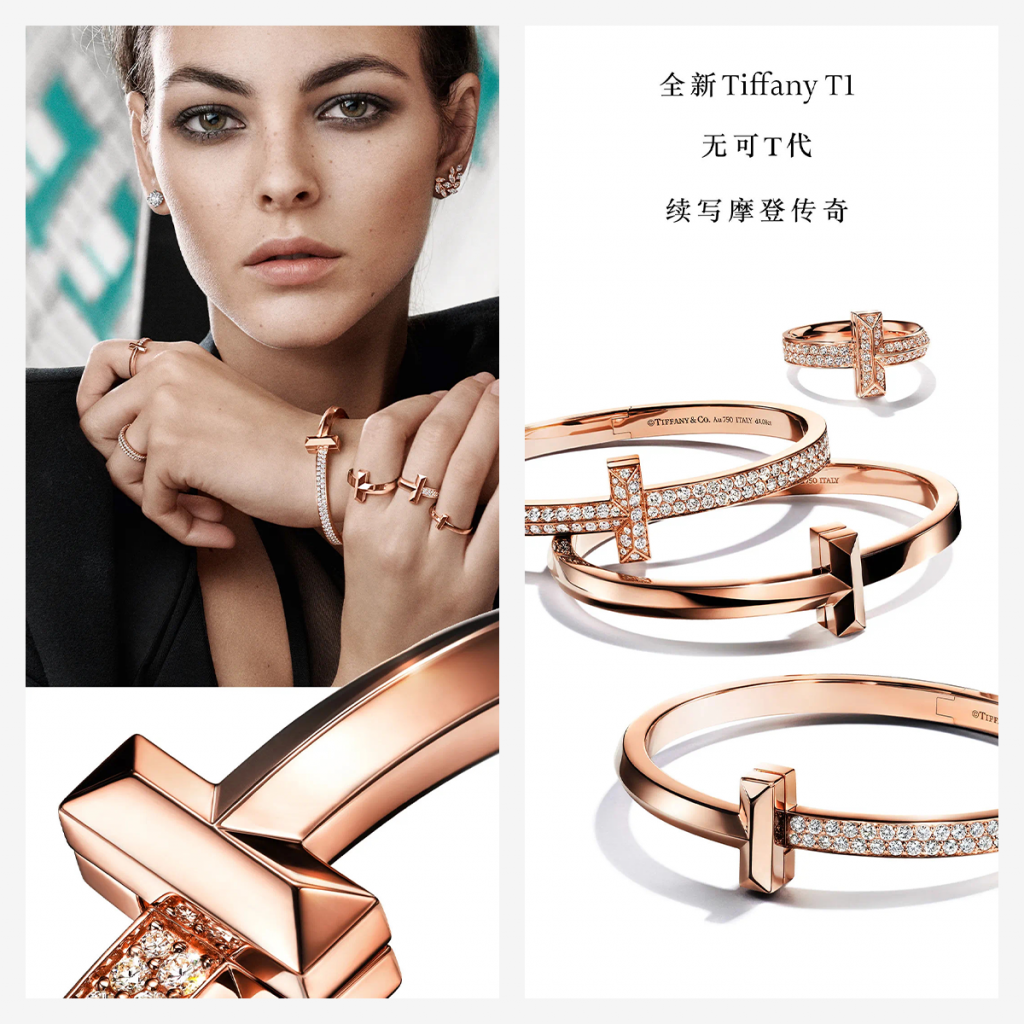
BRAND#
Tiffany & Co.
CATEGORY#
Jewelry
PLATFORMS#
WeChat, Weibo, Little Red Book
MEDIUM#
Short Video, Imagery
OVERVIEW#
To introduce the T1 jewelry collection to Chinese consumers, Tiffany’s rolled out a promotional campaign on WeChat, Weibo, and its newly launched Little Red Book. So far, the campaign’s official 15-second short-video and photos have been released on social platforms. In addition to the official channels, fashion media outlets, including Vogue China, Grazia China, and Marie Claire China, posted the campaign on their Weibo accounts.
NETIZEN REACTION#
The teaser on WeChat posted on April 13 has received over 100,000 views and users are impressed by the designs of the new collection, commenting “it’s my first time looking forward to buying something the moment I see its advertisements.” The brand’s recently-launched official Little Red Book account has garnered over 25,000 followers in one day.
VERDICT#
So far, online traffic around the initiative has been driven by influential fashion media outlets; the campaign has not fully leveraged celebrity endorsement. The campaign’s organic reach and positive reception without the weight of endorsements indicates that the designs stand alone and are resonating well with consumers. Typically, celebrity and KOL endorsements are vital to boost awareness of new products. Now that Tiffany’s is aware the designs are organically received well, they have an opportunity to capitalize even further with the right strategy.Meanwhile, luxury brands should keep the integration between social posts and purchase top-of-mind. In Tiffany’s case, all campaign posts link out to its official website. While it’s a considerable investment for brands to optimize the in-app content-to-purchase loop, a better-engaged user experience on platforms like WeChat has the potential to increase conversion rates.
GUCCI ZODIAC CAMPAIGN#
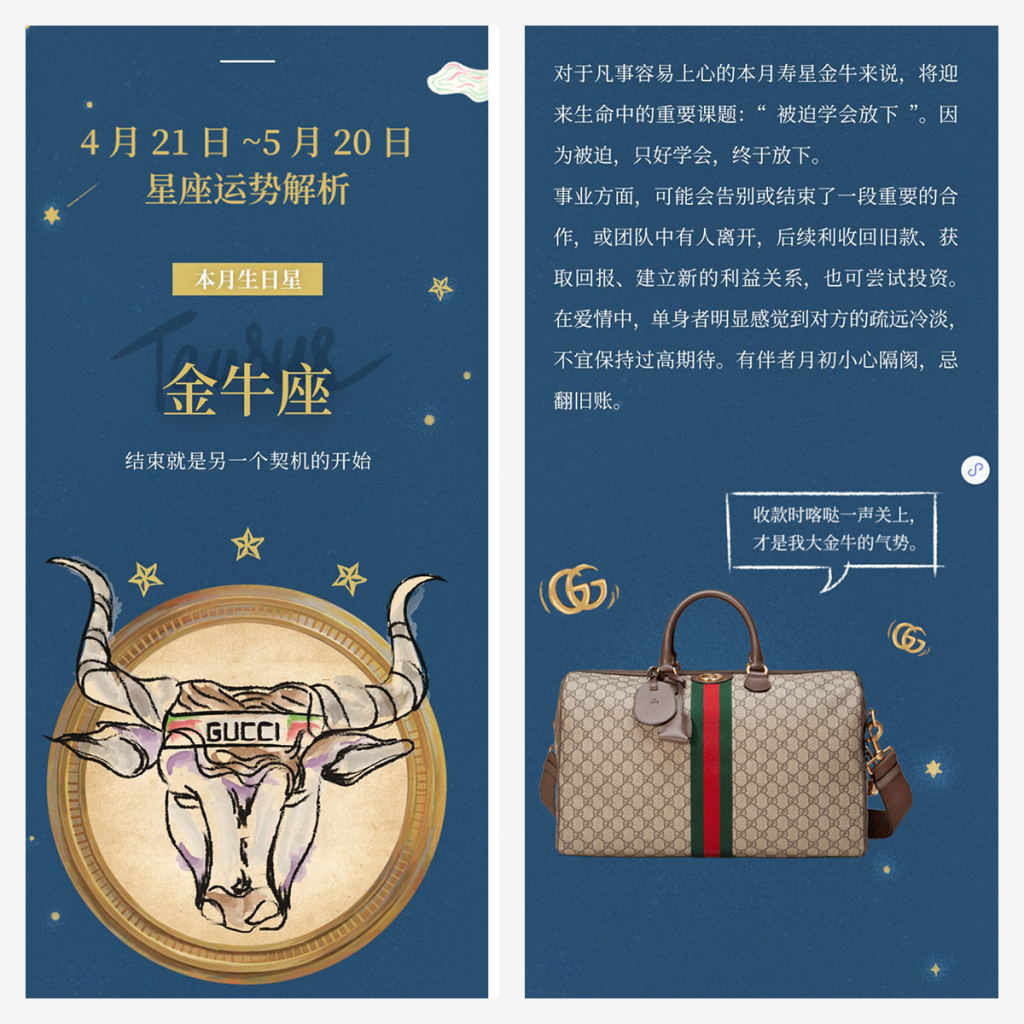
BRAND#
Gucci
CATEGORY#
Luxury
PLATFORMS#
MEDIUM#
Mini Program
OVERVIEW#
Gucci kicked off its monthly “Gucci Zodiac” column on WeChat this week, featuring creative director Alessandro Michele’s inspirations from Greek mythology and the brands’ zodiac-inspired products from the 2019 Fall collection and 2020 DIY series. In addition to the debut of the twelve zodiac sign illustrations, the campaign invites zodiac analysts to share monthly horoscope predictions with users. The recommended products for each zodiac also link out to direct purchase within the brand’s Mini Program. Meanwhile, the Mini Program features more interactive content such as Gucci wallpapers and memes that are available for users to download.
NETIZEN REACTION#
The WeChat post has received over 100,000 views and 329 likes within 12 hours. Users have shown strong interest in the new column, with some users saying that the products recommended by the brand fit their personalities.
VERDICT#
Gucci’s new initiative focuses on zodiacs — a popular topic among Chinese young generations by offering informative and engaging horoscope predictions. The narratives that highlight the connection between Gucci’s iconic products and zodiacs are an effective way to diversify customer experience with the brand. The campaign is expected to build up the personality of the social account and improve digital users’ stickiness. The initiative represents a playful but still on-brand way to reach Chinese consumers.
This is an excerpt from The Social Edition newsletter. For full weekly coverage, subscribe to the newsletter here.
